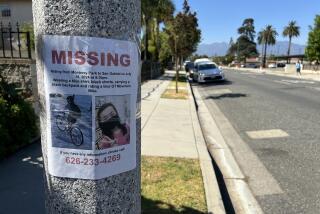The Buck Passes to the Sheriff in Deputies’ Cover-Up : Police: The $16-million jury award in the Samoan party case is justice for victims of beatings and false arrest.
Judge Robert R. Devich has upheld our verdicts, so we jurors finally can discuss the civil trial of a Samoan American family’s charges that Los Angeles County sheriff’s deputies beat and brutalized family members and their friends at a 1989 bridal shower.
Our racially diverse jury of nine government workers, two business executives and a retired person listened to testimony from more than 100 witnesses. Deputy after deputy of the 70-plus who were at the Dole family’s home in Cerritos that night testified that they were barraged by dozens of rocks and bottles thrown by the plaintiffs. One deputy claimed the attack lasted up to 20 minutes as they attempted to disperse the party of about 40 civilians. But a neighbor’s crucial 17-minute videotape (filmed from directly across the street and lit by Skynight, the sheriff’s helicopter) did not reveal a single rock or bottle in sight. It did, however, show deputies striking non-resistant civilians with their batons as they were face down on the drive, the front lawn or the street.
Confronted with that irrefutable evidence, deputies then said the barrage had occurred before the videotape began. So we juxtaposed the taped radio call that they were “taking rocks and bottles” with the audio on the neighbor’s videotape. About 90 seconds lapsed from the frantic “rocks and bottles” call to the first videotape picture of a manicured lawn obscured only by the dozen or so deputies who were standing on it, hands on hips. There was no “war zone” atmosphere or “melee” as had been described by many deputies. Time and again, their own police reports and testimony contradicted them. In the jury room, we developed matrices and flow charts to match up the 36 plaintiffs’ allegations with more than 60 police reports. In June, after two weeks of painstaking review of all the evidence and exhaustive deliberations, we found that almost every civilian at the party had been falsely arrested, many were beaten and a few were virtually tortured.
In the damages phase, we learned that a criminal jury had already acquitted the three men charged with assaulting deputies with rocks and bottles. These men had taken the worst beatings from deputies that night. They had endured a 2 1/2-year criminal prosecution. Our jury listened to weeks of expert medical testimony. We would like to advise our fellow citizens that, with our own tax dollars in mind, we deliberated for another eight days and reviewed stacks of medical records and photographs of injuries before awarding what we believed was necessary to compensate 36 victims for vicious treatment no citizen should ever have visited upon them: $15.9 million.
The damage verdicts we determined ranged from $35,000 for a woman cuffed, harassed and released at gunpoint, to the $3.8 million given to David Dole, who was beaten severely that night by deputies, including head strikes with metal batons and flashlights. He watched his entire family beaten, including five sisters, and his 60-year old father, whose ribs were broken by baton strikes. Dole suffered irreparable physical and emotional damage that no amount of money can ever truly compensate.
These are but a few examples of the voluminous evidence we considered. We didn’t want to believe it, but we saw the photos, heard the testimony and viewed the tape. Are our damage awards still “grossly excessive,” as Sheriff Sherman Block called them? Our conclusions were based on hard evidence so clear, so convincing, that what was most remarkable to us was how the Sheriff’s Department and the district attorney’s investigators missed the obvious conclusion: the innocence of the civilians and the guilt of the deputies.
What lessons are to be gleaned from this tragic incident? All of us make mistakes in the workplace, and police officers work in what is arguably the most high pressured occupation in existence. They must make decisions quickly, often in life-threatening situations. We are all indebted to them for the vital role they play in our society. But they are commissioned with two of a democracy’s greatest responsibilities: to protect its laws and to protect its people. To the chagrin of this pro-law enforcement jury, we have found that many deputies acted to cover up wrongdoing instead of admitting to it. Their testimony often seemed to reflect an attitude that they are above the law.
Even today, after the verdicts have been tendered against the department by two impartial juries, and a distinguished judge has rejected its appeals, the department has not accepted responsibility nor has it taken positive steps such as investigating the deputies we found liable. We jurors will never forget the tragedy that happened to this family and their friends at the hands of those sworn to protect them. We hope incidents such as this will never occur again. The best way to prevent misconduct is to learn from it.
More to Read
Sign up for Essential California
The most important California stories and recommendations in your inbox every morning.
You may occasionally receive promotional content from the Los Angeles Times.






